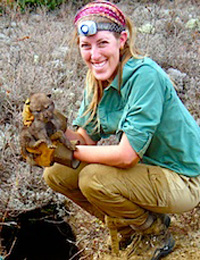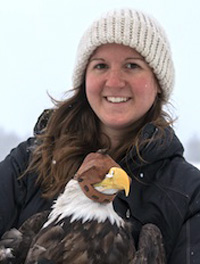Three Environmental Studies doctoral students have been awarded National Science Foundation Graduate Research Fellowships for 2013.
The fellowship program, established in 1952, includes numerous Nobel Prize winners and Google founder, Sergey Brin, as past recipients. Fellows are awarded a three-year living stipend of $30,000, including a $10,500 allowance for tuition and fees, opportunities to network with peers at NSF conferences, and freedom to conduct research at any accredited U.S. research institution of their choice. The competition is open to senior undergraduate students and graduate students in their first or second years of study.
Ann Drevno developed an early interest in environmental and governance issues, fostered by her parents who taught environmental science, and history and politics. At UCSC, Drevno's studies focus on strategies to reduce nonpoint source pollution at the interface of California’s urban and agricultural lands - areas that are marked by rapid population growth and intensified water pollution.
Her research analyzes water quality protection policies, from irrigated lands and cities throughout the state, and specifically in the Central Coast of California. NSF funds will support research that analyzes the strengths and weaknesses of regulations at the urban-agricultural interface, leading to policy recommendations in regions where there are mandates to decrease water pollution. Drevno plans to pursue a career in research and education in environmental policy.
Justine Smith has been involved in ecological research for most of her life. Before enrolling in UCSC’s doctoral program, Smith participated in studies on wolves in Minnesota and Ontario; mountain lions in northern California; pikas in the southern Rocky Mountains; and small mammal communities in Costa Rica.
Her research interests focus on how human impacts on the environment alter predator behavior, and the consequent effects on animal communities. With support from NSF, her research will examine behavioral and ecological responses of mountain lions and their prey to habitat fragmentation in the Santa Cruz Mountains. After completing her studies, Smith plans to conduct international research on endangered and keystone species in modified or disturbed habitats.
Rachel Wheat's research focuses on the impacts of Pacific salmon availability on terrestrial wildlife. Her research In southeastern Alaska examines the extent to which different wildlife species, such as bears, bald eagles, mink, and marten, rely on salmon carcasses for food. She also explores how salmon abundance influences bald eagle migration, and the potential impacts of commercial fisheries on bald eagle behavior.
A strong proponent of public outreach and science education, Wheat has worked hard to develop connections with a wide variety of people, who follow her work at www.ecologyalaska.com.





